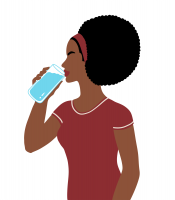Content may contain advertising or affiliate links.
Drinking water is the easiest and best way to quench thirst and replenish fluid losses from sweat, regular bodily functions and breathing. Water also lubricates joints and tissues, promotes skin health, and is necessary for digestion.

Benefits
The daily recommended water intake for humans varies depending on several factors, including age, gender, activity level, and overall health. However, a general guideline suggests that adult men should consume about 3.7 liters (or about 13 cups) of water per day, while adult women should aim for approximately 2.7 liters (or about 9 cups). It’s important to note that these values may vary for a variety of reasons.
Adequate water intake ensures that our bodies are properly hydrated, helping to maintain the balance of bodily fluids. This, in turn, supports various functions like digestion, absorption, circulation, and temperature regulation.
Water is vital for maintaining healthy bodily systems. It aids in flushing out toxins, carrying nutrients to cells, and lubricating joints. Moreover, proper hydration can help prevent common health issues like headaches, constipation, and fatigue.
Drinking water can assist in weight management efforts. Since water has zero calories, substituting sugary beverages with water can reduce overall calorie intake. Additionally, staying hydrated can help control appetite and boost metabolism.
Tips
In our busy lives, it’s easy to forget to hydrate. Set reminders on your phone that prompt you to drink water at regular intervals. These reminders can keep you on track and ensure you meet your daily water intake. Consider using a printed journal or smartphone app to track the amount of water you consume each day.
Carrying a reusable water bottle wherever you go serves as a constant reminder to drink water throughout the day. Choose a bottle with a capacity that aligns with your daily water intake goals. Also consider weight, ease of handling, and how it fits in your car’s cupholder.
Make this a practice when you commute and run errands in your car. This will discourage the need to stop at at convenience store for a soda or fountain drink.
If you find plain water monotonous, add a twist of flavor by infusing it with fruits, herbs, or vegetables. This not only enhances the taste but also provides additional nutrients. Consider portable water flavoring products. However, look for items that are free of sugar or sugar substitutes.

Dehydration
Alcoholic beverages, such as beer, wine, and spirits, are known to have a dehydrating effect on the body. Alcohol acts as a diuretic, which means it increases urine production and subsequently leads to fluid loss. This effect can result in dehydration if not counterbalanced by consuming enough water or other hydrating fluids.
Popular caffeinated beverages like coffee, tea, and energy drinks are widely consumed around the world. While they offer a temporary energy boost, they can also contribute to dehydration. Caffeine is a mild diuretic, promoting urine production and potentially leading to fluid loss. It is important to note that moderate caffeine intake does not usually cause significant dehydration, especially if coupled with adequate water consumption.
Sugary drinks, including soda, fruit juices, and sports drinks, may not be the best choice for hydration. These beverages often contain high amounts of added sugars, which can have a dehydrating effect. When consumed in excess, sugary drinks can increase urination and disrupt the body’s fluid balance. Moreover, excessive sugar intake can lead to other health issues, making it crucial to limit consumption and opt for healthier alternatives like pure water.
